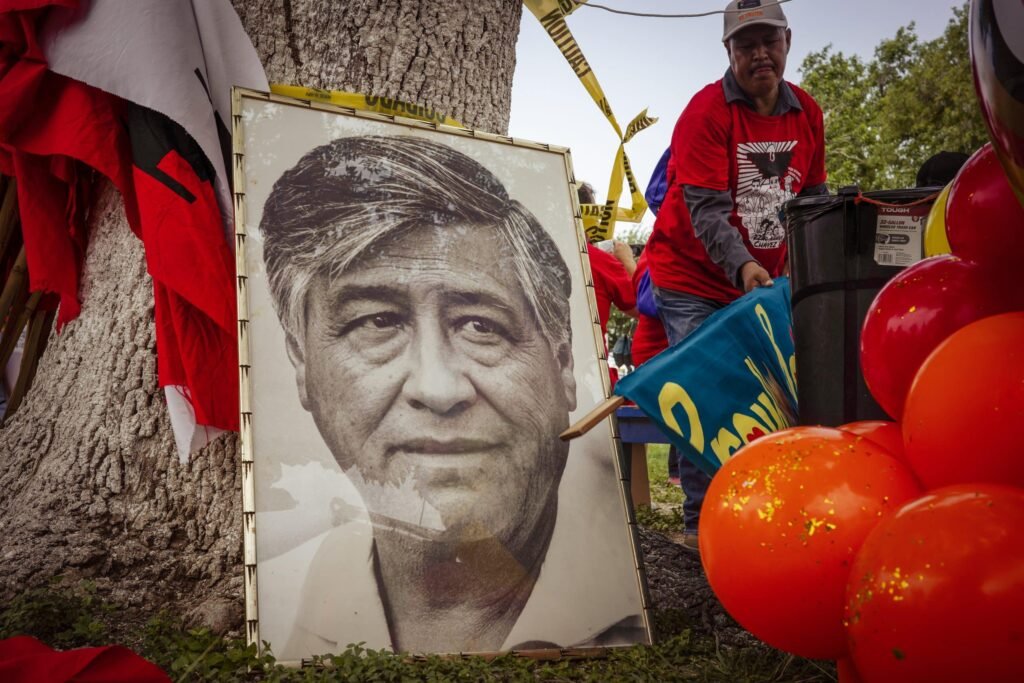March for Justice: Celebrating César Chávez and Advocating for Community Rights in the Rio Grande Valley
The vibrant city of San Juan, Texas, recently buzzed with energy as hundreds gathered to commemorate the 22nd annual César Chávez March, organized by La Unión del Pueblo Entero (LUPE). This celebration not only honors the legacy of civil rights leader César Chávez but also serves as a rallying point for advocacy against ongoing injustices, fostering a spirit of solidarity in the Rio Grande Valley.
Embracing Community and Resilience
As the sun rose amidst a warm, humid spring day—reflective of the pre-summer season in the Valley—marchers filled the streets, undeterred by the heat. The event echoed a resounding sentiment captured in the chant, “Aquí estamos, y no nos vamos,” translating to "Here we are, and we’re not leaving." This year’s theme resonated deeply amid a backdrop of heightened tensions, particularly influenced by the policies of the Trump administration toward immigrants.
Tania Chávez Camacho, LUPE’s executive director, boldly addressed the challenges faced by the community, proclaiming, “Quieren separarnos y quieren dividirnos.” This declaration, meaning “They want to separate us and they want to divide us,” highlights the agency’s ongoing commitment to defend family and community ties against divisive tactics.
The march not only serves as a reminder of the struggles faced by residents but also pays homage to past leaders in the fight for justice, like Dolores Huerta and the late César Chávez himself. Established in 1989, LUPE emerged as a dedicated advocate for colonia residents and farmworkers, addressing issues tied to socio-economic disparities and inadequate infrastructure.
Facing Current Challenges Head-On
Colonia communities in the Rio Grande Valley, often characterized by poor living conditions and insufficient services, have bore the brunt of recent crises. Last month, severe flooding exacerbated by climate change left many residents in despair. This galvanizing event struck hard at the heart of colonias, underscoring vulnerabilities in infrastructure that contribute to ongoing systemic failures.
The march not only commemorated Chávez but served as a vital platform for advocacy, bringing attention to key issues such as immigration enforcement and inadequate disaster response. In recent months, the landscape has seen intensified immigration enforcement actions by Immigration and Customs Enforcement (ICE), with community protests emerging in response to these aggressive tactics. Events in McAllen and surrounding towns captured large crowds protesting against family separations and the criminalization of undocumented individuals.
Community Empowerment through Knowledge
Recent ICE operations have left many local residents on high alert, prompting LUPE to initiate "Know Your Rights" training sessions. These programs aim to equip families with the necessary legal knowledge to navigate interactions with immigration authorities. As Marco Lopez, a community organizer with LUPE, points out, understanding one’s rights is crucial for community empowerment and self-protection.
“We need to defend our families, our friends, our neighbors, our children, our community. Because so much has changed in these last 100 days, but we’re not going to break,” Camacho emphasized, underscoring the importance of unity in the face of adversity.
A Call for Action Amid Environmental Challenges
The environmental challenges facing colonias have been compounded by climate change and inadequate responses to flooding. The devastation from last month’s storm, which led to over 20 inches of rainfall in some areas, revealed the deep-seated vulnerabilities in infrastructure—a clear indication of the urgent need for systemic improvements.
In the aftermath of the flooding, LUPE tentatively mobilized town hall meetings, where residents came together to share their experiences and receive assistance in completing damage surveys for state and federal aid. Despite claims of local and state leaders advocating for federal disaster assistance, the response from higher authorities has been slow and often insufficient.
Texas Governor Greg Abbott and various local leaders have reached out to federal entities seeking aid, yet their appeals have yet to yield the necessary support. Thousands of residents remain uninsured and without adequate resources to recover from the disaster.
Marching Forward Together
Under the hot Texas sun, hundreds of marchers—dressed in red and chanting enthusiastically—made their way along Business 83 towards Alamo. The sounds of community joy and resilience echoed throughout the day, symbolizing solidarity against the backdrop of systemic injustice. Families and individuals of all ages rallied together, reinforcing the notion that their collective strength cannot be undermined.
At the conclusion of the march, participants were encouraged to gather for a community celebration filled with food, music, and camaraderie. This gathering illuminated the spirit of the community—their determination to support one another through shared struggles.
Despite facing significant hurdles—including adverse immigration policies and environmental neglect—the commitment to justice and advocacy remains unyielding within the Rio Grande Valley.
As López poignantly noted, “The only way we’re gonna win this is through love.” The annual César Chávez March encapsulates the ongoing fight for civil and human rights, shining a light on the inherent value of community, resilience, and advocacy.
Conclusion: The Ongoing Struggle for Justice
Marching for justice, the event serves not merely as an annual commemoration but as a vital reminder of the crucial fight for equity and dignity in the face of overwhelming challenges. The commitment shown by the residents of the Rio Grande Valley exemplifies a broader national struggle for immigrant rights and community empowerment to honor the legacies of leaders such as César Chávez.
The march’s enduring presence underscores the need for an ongoing dialogue around these issues, advocating for systemic change and lasting support for marginalized communities. As the community steps forward, their voices resonate loudly—unbending in their quest for justice and unity.
Further Reading: For more information on the history of César Chávez and current immigrant rights issues, learn about the work of organizations like LUPE and other advocacy groups committed to social justice.


